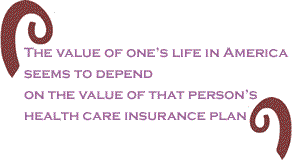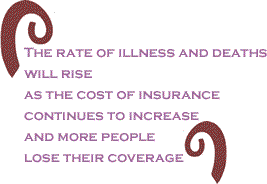
|
|||||||||||||||||||||
 |
|||||||||||||||||||||
 |
|||||||||||||||||||||
 |
|||||||||||||||||||||
 |
|
The newly appointed White House spokesman, Tony Snow, was near tears during his maiden televised press briefing, when he was asked why he wears a yellow cancer-awareness bracelet. Snow paused for 10 seconds, bowed his head and regained his composure. The bracelet symbolized his survival of colon cancer and benefits the Lance Armstrong Foundation. His pause was his reflection on his mother who died of colon cancer when he was 17-years-old. I’m sure it was a heartfelt moment for Snow and that it touched the assembled reporters to hear of his memory. But I also reflect on the thousands of people we, as health care providers, see every year, who gather together in hospital corners grieving over the loss of a loved one because of a disease that could have been prevented or treated. Snow’s survival probably is due to the fact that he could access expensive health care because of his insurance, whereas a person with the same disease might have died because he didn’t have insurance and therefore couldn't access expensive health care.
Because Snow’s mother died of the same disease, he
probably had been monitoring his own health for the cancer. Although
he developed the disease, the fact that he was on the lookout and
practicing preventive measures helped him to be a survivor rather
than a statistic. That doesn’t happen with poor people. They are relegated
to using emergency rooms for their primary care. By the time they
turn up at the hospital, their preventable disease has progressed
to a deadly level. Even if a person is aware of the steps necessary
to practice preventive health care, the lack of affordable insurance
is a barrier to accessing doctor’s visits and medication as a means
of beating back potential illnesses. Many poor people work, but
still can’t afford health insurance. When a person like that dies, his tombstone might
as well read: “Here lies an American citizen who died because he
could not afford health insurance.”
The National Health Care Disparities Report, developed by the Agency for Health Care
Research and Quality (AHRQ), says that Blacks of lower socioeconomic
status tend to have higher rates of death from cancer. While the
rates of cancer death may reflect factors other than access to health
care—e.g. genetics, diet, and lifestyle—screenings and early treatment
can lead to a reduction in the number of cancer deaths. The alarming death rates among Black men due to prostate
cancer and the rate of breast cancer among Black women could be
significantly reduced with access to preventive health care. And
the rate of illness and deaths will rise as the cost of insurance
continues to increase and more people lose their coverage.
So we come back to the reality that having insurance is a major
factor in determining our quality of life or, more bluntly, who
lives and who dies. Tony Snow ended his press conference by paying tribute
to the advances in medicine for curing him. He joked that his doctor
told him that he wouldn’t have to worry anymore about cancer, “just
heartburn” caused by the cynical reporters in the White House press
corp. I wish it could be that funny for the
families who worry and grieve for loved ones who go without medical
care due to lack of affordable health insurance. Our country must
develop a sane approach to providing affordable health care insurance
to the working poor and stop putting priority on profits for pharmaceutical
companies and corporate insurance providers. (Byron Hobbs is president of Local 20 of the Service
Employees International Union, the largest health care workers union
in the Chicago/ Northwest Indiana area. He can be reached at 312.641.1516
or through Communications Dept. at 312.235.4713.) |
|
| Home | |
Your comments are always welcome. Visit the Contact Us page to send e-Mail or Feedback or Click here to send e-Mail to [email protected] e-Mail re-print notice
If you send us an e-Mail message we may publish all or part of it, unless you tell us it is not for publication. You may also request that we withhold your name. Thank you very much for your readership. |
|
| June 29, 2006 Issue 189 |
||||||||||||||
|
||||||||||||||
|
||||||||||||||
| Printer Friendly Version in resizeable plain text format | ||||||||||||||
 |
||||||||||||||
 |
||||||||||||||
 |
||||||||||||||
 |
||||||||||||||
| |
||||||||||||||
| |
||||||||||||||




























